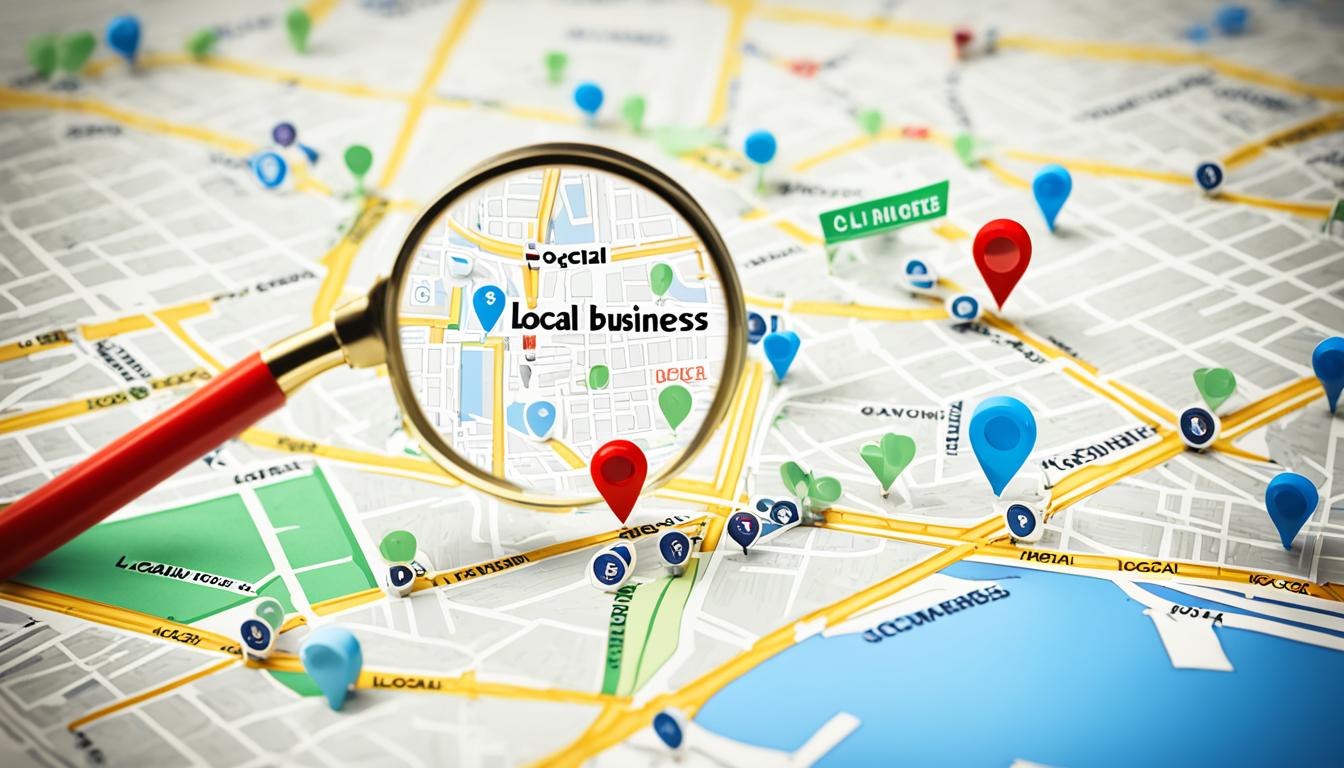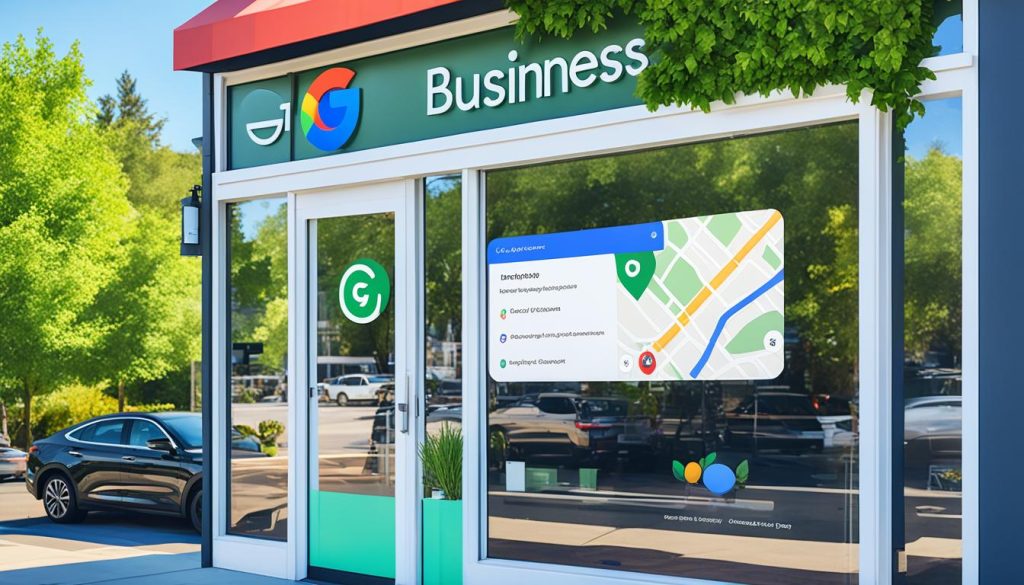Address
304 North Cardinal St.
Dorchester Center, MA 02124
Work Hours
Monday to Friday: 7AM - 7PM
Weekend: 10AM - 5PM
Address
304 North Cardinal St.
Dorchester Center, MA 02124
Work Hours
Monday to Friday: 7AM - 7PM
Weekend: 10AM - 5PM

Did you know, 46% of Google searches seek local info? If your business isn’t locally on point, you might miss reaching key customers. In essence, nailing local SEO is key to staying ahead and thriving now.
Google My Business is top for local search success. It helps meet Google’s criteria well. Inbound links boost your local SEO game, showing Google you’re for real. They can up your ranking, too. Consider links from sponsoring events, hosting, or promoting local things and connecting with key influencers.
Local SEO is all about improving how visible your business is on search engines for local searches. It uses practices specific to certain areas to get more traffic to your website. By doing this, you can reach people in your area right when they need what you offer.
While SEO in general works to make your site more visible nationally or globally, local SEO is different. It focuses specifically on showing up when someone searches for local services “near me”. The aim is to be the first thing they see when they look for things you provide.
Local SEO aims to get more customers from your area by improving your online presence. It uses methods like claiming and updating your Google My Business, posting location-specific content, and getting links from local sites. Doing these things helps your business reach people who are looking for what you sell nearby.
For small businesses with a physical location, local SEO is key to staying ahead in your area. When people search for businesses like yours, you want to be the top result. This strategy helps bring in more customers that are close by, whether they visit your store, call, or book online.
It’s not just about getting more people through the door. Local SEO can also help you build a stronger brand in your community. This can lead to more trust, more people knowing about you, and more sales. And that, in the end, can help your business grow and succeed.
A top-notch Google My Business listing is key for local SEO success. Make sure all details are right, such as your address and phone number. Include a catchy business description and top-notch images too.
Start by making and verifying your account. This shows Google you’re a real, local business.
Add detailed info about your business like services and opening times. Also, accept different payments. Use smart techniques to make your listing interesting and useful.
Share clear photos and videos of your business. This lets people see what you do.
Ask happy customers to review you on Google. Always reply to reviews, showing you care about customers, for good or bad feedback.
Keep your Google listing fresh by updating info, and posting news. Share things that matter to your area.
Check Google’s insights to see how you’re doing. Use the data to make your listing even better.

Using local keywords is key for your small business’s SEO plan. Local keywords are terms with specific places in them. They help your website be seen by people nearby who are looking for what you offer. This way, you can reach more customers in your area.
To find local keywords, think about what your customers might search online. Think about your area’s characteristics. Then, use tools like Google’s Keyword Planner. This will show you what people are searching for near you. It’s a great way to find the best local keywords to use.
After choosing your local keywords, add them to your website naturally. Put them in all parts of your site, like the homepage and blog posts. Also, mention your specific location to show up in searches like “near me.”
More and more people are using mobiles to search for things nearby. So, it’s important to be ready for “near me” searches. Use local keywords on your site and give clear directions there. Also, make your website work well on mobiles.
Put local keywords in your website’s titles and descriptions. This makes your site look more attractive to local users. It can also make more people click on your site, bringing in more traffic.
Don’t forget about general keywords even when using local ones. They help attract people from further away too. This way, you can grow your customer base both locally and beyond.
Keep track of how well your keywords are doing with online tools. See which ones bring in the most visitors and sales. Then, tweak your SEO plan to keep making it better. This helps you keep connecting with the right audience.
In today’s digital world, small businesses need to be easy to find online in their local business. This makes local SEO methods very important. By using effective local SEO strategies, small businesses can improve their online presence locally. They can also attract more customers.
To do this, companies should focus on optimising Google My Business listings and targeting local keywords. They should also keep a close eye on their online reviews. This approach helps small businesses become well-known in their local areas. It helps them grow their brand and earn the trust and loyalty of local customers. They’ll also stand out from their competitors.
Getting local links and citations is like setting up digital signposts to your place. A local link happens when a site from your area links to yours. Citations are mentions of your business on sites with your details, acting like a vote of trust. This tells search engines you’re a genuine and trusted player locally.
Local links and citations are vital to boost your online visibility. They make your business known and trusted locally. This boosts your chance of showing up in searches relevant to your location.
The role of local citations is huge. They show search engines and users that your business is true, active, and reliable locally. By keeping your local citations up-to-date, you increase the chances of being seen in local searches.
To create a good local backlink network, team up with local groups, support community events, and join local activities. Also, reaching out to local sites, blogs, and influencers can get you important local links.
Keeping your local citations correct and updated is key for a solid online presence. Make sure your business details are the same in all listings. Always check and adjust your citations if any information changes.

Google is getting smarter every day. This is good news for content creators. They can focus on writing for people, not just to please search engines. While discussing broad subjects attracts many readers, sometimes it’s vital to be specific. Try writing about local content creation for seo or the latest industry news to grab the local audience’s attention. By doing this, you become the go-to authority in your region. Share news about industry events, employees, and useful tips on your blog. Include content that’s not just sales-related, like a guide welcoming new businesses to the area.
Creating local marketing strategies for small businesses helps position your brand as a reliable local source. This approach not only improves your visibility on search engines but also strengthens connections with people in your community.
| Local Content Creation Tactics | Benefits for Local SEO |
|---|---|
| Hosting a local industry event or webinar | Establishes your business as an authoritative voice in your field, generates backlinks and online mentions |
| Profiling local employees or community leaders | Showcases your involvement in the local area, builds trust and brand awareness |
| Creating a guide to your city for new businesses | Provides useful information, positions your business as a helpful resource, attracts local search queries |
| Covering local industry news and trends | Demonstrates your expertise, increases engagement with your local audience |
Adopting these local content creation for seo and advertising strategies can make your business a top community resource. This drives more quality traffic and leads to your enterprise.
Google now sees social media posts more vital than ever. After setting up your Google My Business page, share it online. This step links social media for local seo and SEO.
Active social media use and regular Google My Business updates are key. They help upgrade your local search visibility. They also allow you to reach and engage your local audience better.
Facebook, Instagram, and Twitter are standout platforms. They let you showcase your business and connect with customers. Frequent posts, sharing local news, and talking with followers can boost your online and local presence.
Use tools like Facebook Places and Instagram‘s location tagging. They help locals discover and interact with your business. This approach enhances your using social media to boost local search visibility efforts. It also builds a close-knit community around your brand.
To drive social media for local seo success, focus on creating valuable content. Understand your local audience’s needs and interests. This helps you gain a loyal following and improve your chances in local search results.
Local and mobile search are closely linked, with 61% of Google searches done on mobile. People often use sites on their phones to check reviews, get directions, or find contact details. Since 2017, searches with “near me” have increased 250%. To meet customer needs, ensure your website is mobile-friendly.
| Metric | Value |
|---|---|
| Percentage of Google Searches Performed on Mobile | 61% |
| Increase in “Near Me” Searches on Mobile Since 2017 | 250% |
The importance of a mobile-friendly website for local search can’t be stressed enough. Optimising your site for mobile will attract more mobile users, letting you engage with your local target audience. Focus on mobile optimisation for local SEO to offer a smooth experience. This improves your chance of converting visitors into customers.
Local search engine optimisation (SEO) work is never done once. It’s something you keep improving. To be sure your strategies are working, it’s important to track your local SEO and measure how well you’re doing. This lets you make changes based on real data to get better noticed and bring in more local customers.
First, use Google Search Console. It shares insights into which keywords are bringing people to your site. Knowing what local keywords work best helps you focus your content and improving your site. Also, Google Analytics 4 is key. It shows detailed traffic and conversion information. This way, you can see which keywords are bringing in sales or bookings.
Keep a close eye on these analytics to always better your local SEO. SEO work is step by step. By checking how you’re doing and making changes, you’ll improve in local search.
Local SEO is key for small businesses to shine online and draw in more customers. By tweaking Google My Business profiles, aiming for local keywords, and handling online reviews well, they can outshine local competition. Thus, mastering Local SEO helps such businesses get noticed, trusted, and beloved by locals.
This guide shares valuable advice for small businesses in the United Kingdom looking to ace local SEO. It suggests working on your Google My Business page, picking the right local keywords, and using local content and social media wisely. These efforts will lift your visibility online and better connect you with people interested in what you offer.
Keep in mind, mastering local SEO is a journey that never truly ends. It involves always seeking to do better, and staying flexible. So, keep an eye on how you’re doing, tweak your approach, and make sure your strategies keep bringing in the results you want. With effort and a smart local SEO game plan, your small business can truly flourish online and become a big name in your area.